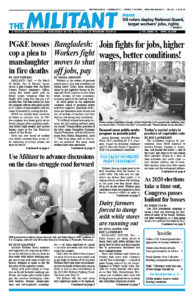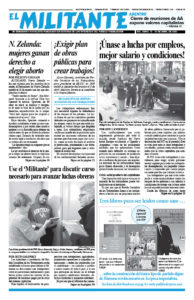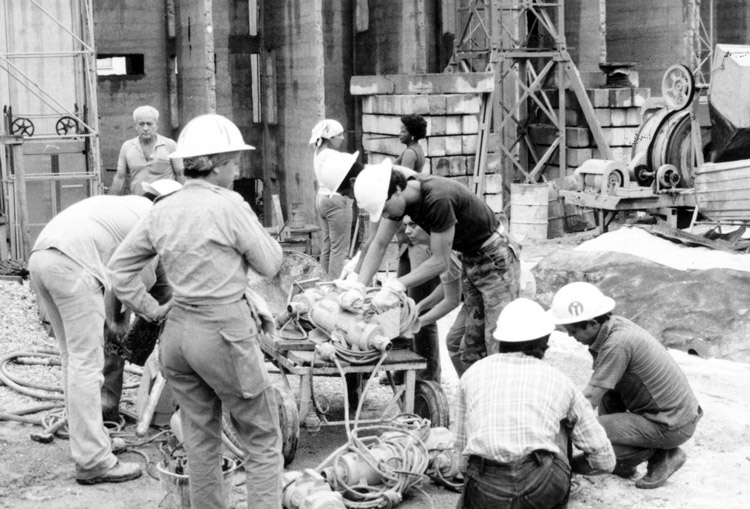Che Guevara: Economics and Politics in the Transition to Socialism by Carlos Tablada is one of Pathfinder’s Books of the Month for April. It was originally published in Cuba in 1987 as part of the rectification process initiated by Fidel Castro. This involved the mobilization of working people in a political fight to reverse damage from years of bureaucratic economic planning Cuba adopted in the early 1970s modeled on those of the Stalinist Soviet regime. Fidel led this fight, calling for a revival of the political and economic course championed by Ernesto Che Guevara, which is outlined in the book. Excerpts from the introduction are printed below. Copyright © 1998. Reprinted by permission of Pathfinder Press.
In the 1987 speech that serves as a prologue to this book, [Fidel] Castro remarks that “at a given moment some of Che’s ideas were incorrectly interpreted and, what’s more, incorrectly applied. Certainly no serious attempt was ever made to put them into practice, and there came a time when ideas diametrically opposed to Che’s economic thought began to take over.” …
By the early 1980s, however, the devastating political consequences of the course that had been copied and imported were becoming increasingly clear as communist political consciousness among Cuba’s working people faltered, demoralization spread, and corruption grew. …
By 1986 Cuba’s communist leadership, with Fidel Castro in the lead, had launched the revolutionary political counteroffensive on questions of economic policy that became known as the rectification process. Corruption and privilege were systematically addressed and substantially reduced. Living and working conditions of agricultural workers and others in the lowest-paid categories were improved. Child care and other needs of women workers were given new priority.
From the outset of the rectification process, volunteer labor — “one of the best things [Che] left us during his stay in our country and his part in the revolution,” said Castro — was revived in Cuba. It was promoted by the leadership as a lever of revolutionary action to take steps forward, through collective efforts, to address the most pressing social needs such as housing, nurseries, clinics, and schools. For some fifteen years, Castro said, such efforts had been steadily on the decline because of “the bureaucrat’s view, the technocrat’s view that voluntary work was neither basic nor essential,” but rather “kind of silly, a waste of time.” Beginning in 1986, however, voluntary labor was reborn. The construction “minibrigades,” as they were called, assumed an even greater centrality to the revolution and working class than similar efforts during the early years of the Cuban or Russian revolutions.
Rectification took on the character of a growing social movement led by Cuba’s most conscious and disciplined working people who were convinced that the brigades opened the road toward a return to proletarian methods that could advance the revolution and strengthen social consciousness.
Just as the bureaucratic parties and regimes of Eastern Europe and the USSR were finally beginning to shatter in face of irresolvable economic, social, and political crises building up for decades, the Cuban revolution was gaining strength along the lines of the communist political course of rectification. This renewal, Fidel explained in his October 1987 tribute, would have given Guevara much joy and confidence, just as he would have been “appalled” by what had preceded it. Because, Castro said, Che “knew that communism could never be attained by wandering down those worn capitalist paths and that to follow along those paths would mean eventually to forget all ideas of solidarity and even internationalism.”
As the rectification process was gaining new momentum in 1989, the Cuban revolution was suddenly confronted with the most severe economic crisis in its history. The crisis was precipitated by the abrupt decline in aid and trade on favorable terms with the disintegrating regimes in the Soviet bloc. The “special period,” as it is known in Cuba, registered a decline in economic production estimated at some 35 percent — equal to or greater than the fall in U.S. output during the opening years of the Great Depression of the 1930s. Stepped-up efforts by Cuba’s revolutionary government to find new trading partners and sources of development capital were met by intensified economic warfare instigated and organized by Washington.
Enemies of the working class the world over gleefully predicted that the revolutionary government of Cuba would soon suffer a fate similar to the regimes of Eastern Europe and the USSR. Once again they were wrong. They failed to understand — as they had many times before — that the proletarian internationalist course Che’s name was associated with in Cuba and around the world was not his alone, but was indeed the trajectory of Cuba’s communist leadership, deeply rooted among the big majority of Cuba’s working people. This was not a variant of the course in the Soviet Union and Eastern Europe, but its antipode.
No other government in the world could have survived the test of popular support that Cuba’s revolutionary leadership has faced in the 1990s. In meeting the challenge of the special period, moreover, the Cuban working class has emerged stronger, not weaker. Today it is more conscious of its historic responsibilities, and more confident of its collective capacity to resist, to fight, and to win. The rectification process of the previous decade was decisive in this outcome. …
What Cuba faces today is not a crisis of socialism, however. Above all, the Cuban toilers are confronting the brutal realities of an economically underdeveloped country in a world still dominated by capitalism, and the terms of struggle imposed by the exploiting classes on those who are determined to chart a way forward for humanity. …
It is the capitalist world that will face the gravest crisis in the years ahead. “The exploiters are starting to get afraid again,” Castro noted. “They’re afraid of social upheaval, afraid of social explosions, afraid of chaos . . . because they don’t really know what’s going to happen.”


